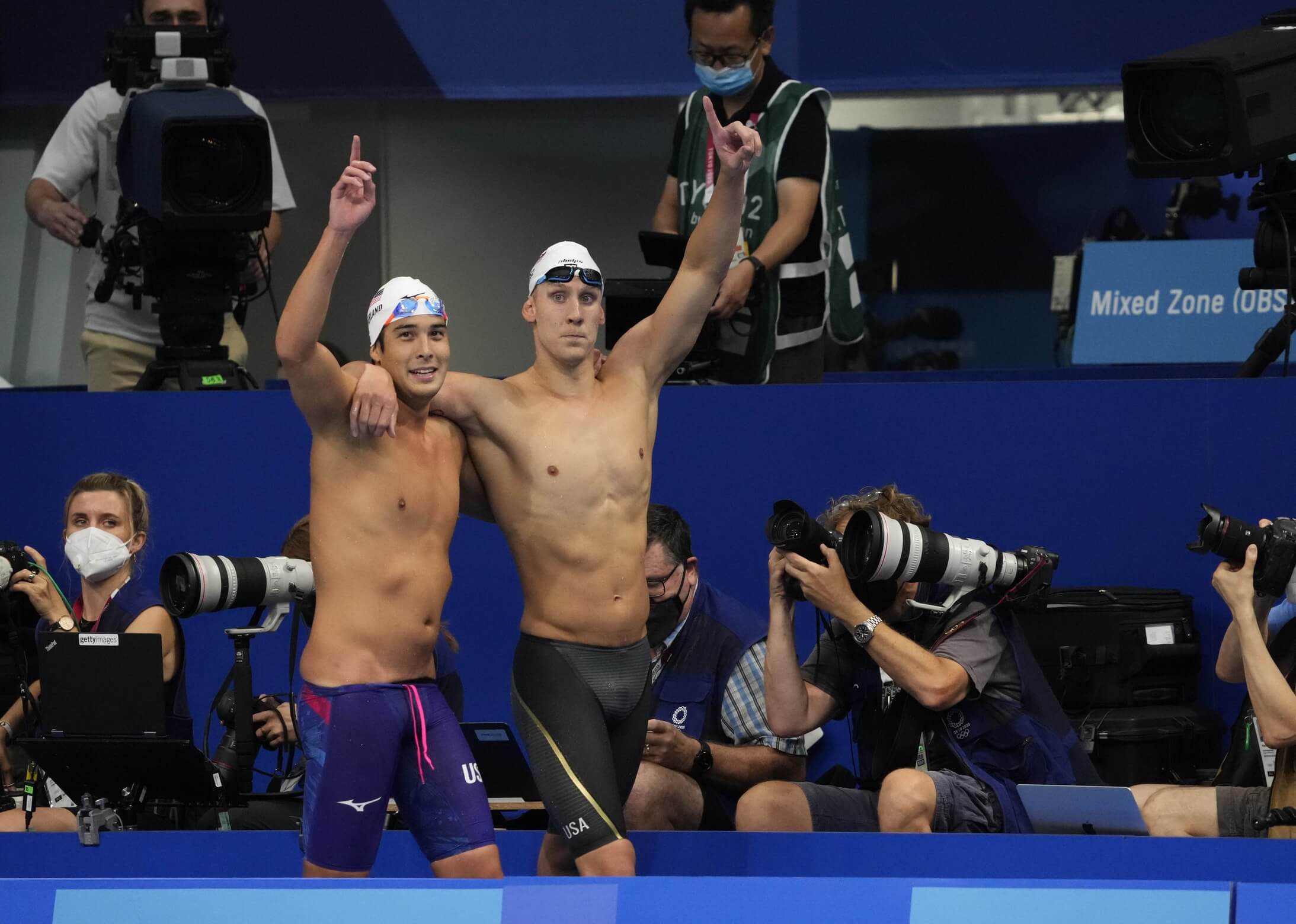
Tokyo Flashback: Chase Kalisz and Jay Litherland Go Gold-Silver to Power USA in 400 Individual Medley
One year has passed since the Olympic Games, delayed by a year due to COVID-19, unfolded in Tokyo. To celebrate what went down in the Japanese capital, Swimming World is revisiting the championship finals – each on their one-year anniversary – by once again running the stories that were posted after the medals were decided.
Four years ago, Chase Kalisz walked away from the Olympic Games in Rio de Janeiro with a silver medal in the 400-meter individual medley, but with the intent of securing gold at his next opportunity at the Tokyo Games. Well, the American had to wait an additional year to play the role of alchemist, but he officially adopted that identity on Sunday morning when the 27-year-old prevailed in his prime event.
In control from the early stages of the breaststroke leg, Kalisz prevailed in 4:09.42, with his American teammate and training partner Jay Litherland picking up the silver medal in 4:10.28 to give the United States the best possible start to the Games. The bronze medal went to Australian Brendon Smith in 4:10.38.
“It is my lifelong dream,” Kalisz said. “It is what everyone dreams of in the sport. I do feel like I let the U.S. down in 2016, even though I swam faster there. The U.S. has a proud legacy in the 400 individual medley. This was my redemption story.”
The final was considerably slower than the prelims, in which six athletes clocked sub-4:10. In the final, only Kalisz cracked that barrier. But the Olympic Games are about racing and getting to the wall first, and no one will be able to remove the gold from around Kalisz’s neck. By ascending to the top step of the podium, Kalisz handed the United States its sixth title in the event in the past seven Games.
After Tom Dolan (1996/2000) and Michael Phelps (2004/2008) repeated as champions, Ryan Lochte earned gold at the 2012 Games. That five-Olympics streak was snapped in 2016 when Kalisz finished behind Japan’s Kosuke Hagino, but emerged with a vow to get the United States back on top in Tokyo. Obviously, his goal was met.
Kalisz’s triumph was made sweeter by Litherland’s silver medal, as the pair train together at the University of Georgia under coach Jack Bauerle. While Kalisz was in control throughout the race, Litherland turned to the biggest weapon in his arsenal – his freestyle leg. Closing in 56.72, Litherland moved from sixth after the breaststroke to a place on the medals stand.
Kalisz’s effort was well-balanced, as he sat in second place after the opening butterfly and backstroke legs. As is his trademark, Kalisz moved into the lead on the breaststroke leg, behind a split of 1:09.14, the fastest in the field. At that point, he had a sizable advantage on his competitors and raced comfortably to gold.
Much like Kalisz, Litherland left Rio wanting more than the fifth place he got at the last Games. Litherland may not be as lethal on the first three strokes as some of his rivals, but his freestyle ability is a game-changer. While many foes struggle in the latter stages of the grueling event, Litherland has a knack for picking off his foes in methodical fashion.
“It feels good,” he said. “It is a dream of mine. In Rio, I got fifth and it didn’t feel satisfying. To come back and do this with Chase. It means a lot.”
Before the final unfolded, the event had already underdone a change in dynamic, due to a pair of unforeseen developments. First, as the Games were set to begin, European champion and world junior record holder Ilya Borodin tested positive for COVID-19 and was sent home to Russia. Then, in the preliminaries, gold-medal favorite Daiya Seto finished a stunning ninth to miss the championship race by one spot.
A three-time world champion in the event, Seto looked superb through the opening 300 meters and appeared on his way to the top seed. But a horrid freestyle leg, which the Japanese standout attributed to miscalculating his closing speed, allowed the field to catch up to Seto and make him a spectator for a final he was expected to rule.
Meanwhile, back in the United States and under much less pressure, American rising star Carson Foster clocked 4:08.46 for the 400 medley at the Austin Sectionals. Foster figures to play a significant role in the future of the United States’ success in the pool, but he was third at the Olympic Trials, reeled in over the last lap by Litherland and denied the chance to contend in Tokyo.
Men’s 400 Individual Medley
World Record: Michael Phelps, United States, 4:03.84 (2008)
Olympic Record: Michael Phelps, United States, 4:03.84 (2008)
Final Results
1. Chase Kalisz (United States) 4:09.42
2. Jay Litherland (United States) 4:10.28
3. Brendon Smith (Australia) 4:10.38
4. David Verraszto (Hungary) 4:10.59
4. Max Litchfield (Great Britain) 4:10.59
6. Leon Marchand (France) 4:11.16
7. Lewis Clareburt (New Zealand) 4:11.22
8. Alberto Razzetti (Italy) 4:11.32
